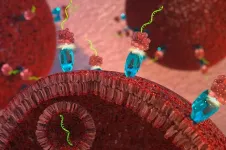(Press-News.org) WEST LAFAYETTE, Ind. – A new cancer therapy developed by Purdue University researchers attacks tumors by tricking cancer cells into absorbing a snippet of RNA that naturally blocks cell division. As reported today in Oncogene, tumors treated with the new therapy did not increase in size over the course of a 21-day study, while untreated tumors tripled in size over the same time period.
Cancer can begin almost anywhere in the human body. It is characterized by cells that divide uncontrollably and that may be able to ignore signals to die or stop dividing, and even evade the immune system. The therapy, tested in mouse models, combines a delivery system that targets cancer cells with a specially modified version of microRNA-34a, a molecule that acts “like the brakes on a car,” slowing or stopping cell division, said Andrea Kasinski, lead author and the William and Patty Miller Associate Professor of biological sciences at Purdue University.
In addition to slowing or reversing tumor growth, the targeted microRNA-34a strongly suppressed the activity of at least three genes – MET, CD44 and AXL – known to drive cancer and resistance to other cancer therapies, for at least 120 hours. The results indicate that the patent-pending therapy, the newest iteration in more than 15 years of work targeting microRNA to destroy cancer, could be effective on its own and in combination with existing drugs when used against cancers that have built drug resistance.
“When we acquired the data, I was ecstatic. I am confident that this approach is better than the current standard of treatment and that there are patients who will benefit from this,” said Kasinski, a member of the Purdue Institute for Cancer Research.
MicroRNA-34a is a short double strand of ribonucleic acid – a string of ribonucleic acids attached like the teeth of a zipper along the length of a sugar-phosphate chain. The two strings of the microRNA are unevenly zipped together, with one string acting to guide a protein complex to the worksite in the cell while the other string is destroyed.
In healthy cells, microRNA-34a is abundant, but its presence is dramatically reduced in many cancer cells.
While the idea of reintroducing microRNA-34a to cancer cells appears simple, the research team had to overcome many challenges in crafting an effective therapy. Naturally occurring RNA breaks down rapidly, so to improve the durability of the therapy, the team stabilized microRNA-34a by adding several small clusters of atoms along the length of the strand. The team modeled its modifications on an FDA-approved chemical structure that researchers at the biotechnology company Alnylam used on similar short interfering RNAs. Experiments on mouse models show the modified microRNA-34a endures for at least 120 hours after being introduced.
As a bonus, the fully modified microRNA-34a is invisible to the immune system, which would ordinarily attack double-stranded RNA introduced to the body.
To ensure the modified microRNA-34a makes it to cancer cells, the team attached the double strand to a molecule of the vitamin folate. The surfaces of all cells in our body have receptors that bind to folate and draw the vitamin into the cell, but the cells in many cancers – breast, lung, ovarian and cervical – have far more folate receptors on their cell surface than do healthy cells. The tiny microRNA-34a and folate compound penetrates the dense tissue of tumors and binds to the folate receptor on the cell surface. It is then drawn inside in a little bag of cell membrane called a vesicle. Once inside the cell, some of the microRNA-34a is able to escape the vesicle and slows cell division.
The targeted specificity of the therapy reduces the amount of the compound that must be administered to be effective, which in turn reduces potential toxicity, side effects and cost. The team can also prepare a separate version, which targets a different cell surface receptor, for prostate cancer cells, which do not produce excessive folate receptors. Kasinski and her team are confident in the value of the most recent iteration and will prepare for clinical trials.
At Purdue, Kasinski was joined in the research by Philip S. Low, Presidential Scholar for Drug Discovery, Ralph C. Corley Distinguished Professor of Chemistry, and inventor of the FDA-approved drug Cytalux; Nadia A. Lanman, a research assistant professor; Ahmed M. Abdelaal, first author and a graduate student in Kasinski’s lab; and researchers Harish Kothandaraman, Kasireddy Sudarshan, Shreyas Iyer and Ikjot S. Sohal. “A first-in-class fully modified version of miR-34a with outstanding stability, activity, and anti-tumor efficacy” was published in Oncogene with support from the National Institutes of Health and the Department of Defense.
Kasinski disclosed the innovation to the Purdue Innovates Office of Technology Commercialization, which has filed a patent application on the IP. Industry partners interested in developing or commercializing the work should contact Joe Kasper, assistant director of business development, JRKasper@prf.org.
END
First-in-class targeted microRNA therapy slows cancer tumor growth
2023-09-04
ELSE PRESS RELEASES FROM THIS DATE:
Invasive Alien Species Pose Major Global Threats to Nature, Economies, Food Security and Human Health: IPBES report
2023-09-04
The severe global threat posed by invasive alien species is underappreciated, underestimated, and often unacknowledged. According to a major new report by the Intergovernmental Platform on Biodiversity and Ecosystem Services (IPBES), more than 37,000 alien species have been introduced by many human activities to regions and biomes around the world. This conservative estimate is now rising at unprecedented rates. More than 3,500 of these are harmful invasive alien species – seriously threatening nature, nature’s contributions to people and good quality of life. Too often ignored until it is too late, invasive alien species are a ...
Korean Scientific payload for observing the lunar space environment begins its transfer to the US for the scheduled 2024 launch
2023-09-04
The Ministry of Science and ICT (Minister Jong-Ho Lee, hereinafter referred to as 'MSIT') and the Korea Astronomy and Space Science Institute (Director Young-Deuk Park, hereinafter referred to as 'KASI') announced the beginning of the transfer of the lunar space environment monitor, 'LUSEM'(Lunar Space Environment Monitor) that will be aboard United States’ unmanned lunar lander in 2024, has began on September 4th.
LUSEM is a payload developed by the Korea Astronomy and Space Science Institute (KASI) in participation with the U.S. NASA's CLPS(Commercial Lunar Payload Services) initiative ...
IOP Publishing appoints Dr. David Gevaux as Chief Editor of Reports on Progress in Physics
2023-09-04
IOP Publishing (IOPP) has appointed Dr. David Gevaux as the first Chief Editor of Reports on Progress in Physics. Taking up the post from the 4th of September, Dr. Gevaux will lead on ambitious plans for the journal, as its scope expands to include groundbreaking new research content alongside the authoritative reviews for which it is well known across all areas of physics.
Working closely with Professor Subir Sachdev, the Editor in Chief of Reports on Progress in Physics, Dr. Gevaux will champion the editorial ...
New study uncovers the Causes of the Qing Dynasty's Collapse
2023-09-04
The Qing Dynasty in China, after over 250 years, crumbled in 1912. Led by the Complexity Science Hub (CSH), an international research team has pinpointed key reasons behind the collapse, revealing parallels to modern instability and offering vital lessons for the future.
China is considered today to be the world's largest economy (in terms of PPP). However, this position is not new. In 1820, China's economy already held the top spot, accounting for 32.9% of the global GDP. In the interim, there was a period of decline followed by a resurgence. In 1912, after over 250 years in power, the Qing Dynasty collapsed despite being considerably wealthier at the time ...
New genes and natural toxins offer hope for cancer patients unresponsive to chemotherapy
2023-09-04
Scientists from Queen Mary University of London have discovered two new genes that cause head and neck cancer patients to be resistant to chemotherapy, and that silencing either gene can make cancer cells previously unresponsive to chemotherapy subsequently respond to it.
The two genes discovered actively ‘work’ in most human cancer types, meaning the findings could potentially extend to other cancers with elevated levels of the genes.
The researchers also looked through a chemical library, commonly used for drug discovery, and found two substances that could target the two genes specifically and make resistant cancer cells almost 30 times more sensitive to ...
Better cybersecurity with new material
2023-09-04
Digital information exchange can be safer, cheaper and more environmentally friendly with the help of a new type of random number generator for encryption developed at Linköping University, Sweden. The researchers behind the study believe that the new technology paves the way for a new type of quantum communication.
In an increasingly connected world, cybersecurity is becoming increasingly important to protect not just the individual, but also, for example, national infrastructure and banking systems. And there is an ongoing race between hackers and those trying to protect information. The most common way ...
People with lung conditions face extra risks from climate change
2023-09-04
People living with lung conditions, such as asthma and chronic obstructive pulmonary disease (COPD), face even greater risks from climate change, according to an expert report published today (Monday) in the European Respiratory Journal [1].
The report brings together evidence on how the effects of climate change, such as heatwaves, wildfires and flooding, will exacerbate breathing difficulties for millions of people around the world, particularly babies, young children and the elderly.
On behalf of the European Respiratory Society, which represents more than 30,000 lung specialists from 160 countries, the authors ...
ChatGPT is debunking myths on social media around vaccine safety, say experts
2023-09-04
ChatGPT could help to increase vaccine uptake by debunking myths around jab safety, say the authors of a study published in the peer-reviewed journal Human Vaccines and Immunotherapeutics.
The researchers asked the artificial intelligence (AI) chatbot the top 50 most frequently-asked Covid-19 vaccine questions. They included queries based on myths and fake stories such as the vaccine causing Long Covid.
Results show that ChatGPT scored nine out of 10 on average for accuracy. The rest of the time it was correct but left some gaps in the information provided, according to the study.
Based on these findings, experts who led the study from the GenPoB research group based ...
Growing evidence supporting the protein leverage hypothesis
2023-09-04
Humans, like many other species, regulate protein intake more strongly than any other dietary component and so if protein is diluted there is a compensatory increase in food intake. The hypothesis proposes that the dilution of protein in modern-day diets by fat and carbohydrate-rich processed foods is driving increased energy intake as the body seeks to satisfy its natural protein drive - eating unnecessary calories until it does so.
This paper, resulting from the Royal Society Discussion Meeting held in London last October, shows that observational, experimental and mechanistic research increasingly supports ...
Why breast cancer survivors don't take their medication, and what can be done
2023-09-02
For roughly 80% of breast cancer survivors, treatment doesn’t end with surgery, radiation and chemotherapy. Instead, for the next five to 10 years, doctors recommend that they take medication to block sex hormones, which can fuel tumor growth and spark recurrence.
The drugs are life-saving: They’ve been shown to cut risk of cancer recurrence by as much as half in patients with hormone receptor-positive tumors (HR+)—the most common form of breast cancer. Yet despite their promised benefits, 40% of patients stop taking them early and a third ...







